Preface: The military campaign[1] launched by the Syrian regular forces on Eastern Ghouta, since November 15, 2017, led to the complete cessation of the educational process in the area. Where the Directorate of Education in Damascus countryside[2] made successive decisions concerning the suspension and resumption of the school attendance due to the intensity of the shelling of many Eastern Ghouta cities and towns. According to Syrian for Truth and Justice/STJ reporter, the beginning of exams, on the morning of January 13, 2018, coincided with the shelling on the area links between Duma and Harasta with poisonous gases, which caused nausea and shortness of breath to some students in Duma city, and led to the suspension of the educational process again.
On January 21, 2018, school attendance was resumed, and was coincided with the use of toxic gases by Syrian regular forces again on Duma city[3] on January 22, 2018, which resulted in the suffering of some students from the same symptoms of those affected in the first shelling.
Schools also were not spared the bombardment of the Syrian regular forces and their allies during the period from December 29, 2017, to February 1, 2018. Where a number of schools in Eastern Ghouta were totally destructed due to shelling, including “Al-Majd” high school, in Irbin town, as it got out of service being shelled by warplanes believed to be Russian on January 5, 2018.
On January 6, 2018, a primary school in Outaya town was shelled, causing considerable material damage to the school with no causalities.
On February 1, 2018, artillery shelling on residential neighborhoods in Duma city hit "Dhiraar" elementary school and the Duma Linguistic Private Institute[4], which resulted in the death of two children, one of whom was a student of the institute, and the injury of 12 civilians, also including students of the Institute, as well as a significant material damage to the school and the institute.
STJ had earlier prepared a report documenting deaths and injuries among students, as a result of the shelling of two schools in Eastern Ghouta by the Syrian regular forces.
First: Suspension of the Educational Process due to the Military Campaign:
The Directorate of Education in Damascus countryside made successive decisions on the suspension of schools attendance from December 30, 2017, with the resumption of the mid-year exams in an emergency plan[5] to be started on January 13, 2018.
Coinciding with the commencement of the exams, in the morning of January 13, 2108, the area between Harasta[6] and Duma[7] cities was shelled with rockets loaded with poisonous gases, coinciding with the departure of students from their houses toward schools, which caused nausea, shortness of breath and dizziness for some students, although its effects wears off after hours, it caused them lack of focus on exams.
This escalation pushed those who manage the educational process in Eastern Ghouta to re-suspend it, and resume it on Sunday, January 21, 2018. The Syrian regular forces used poisonous gases on Duma again in the following day, January 22, 2018, which resulted in the suffering of some students from the same symptoms of those affected in the first shelling
As a result, the quality of the educational process has been decreased where the attendance of the school staff was suspended, as well as the reduction in the daily working hours of the Directorate of Education workers, with the aim of reducing casualties caused by the campaign.
Iman Muhammed, one of the teachers who work in a private educational institution in Duma city, spoke to STJ about the students’ first day of the exam in her school, which coincided with Eastern Ghouta’s exposure to poisonous gases on the morning of January 13, 2018, where she said:
"When we entered the examination rooms, we noticed that students attendance in some of them was only 50%, at best 70%, means that the rest were deprived from doing the exam. However, we expected this absence of a large proportion of students, because of the risks they may be exposed to. Students are forced to go to their schools on foot because of the lack of transportation and the deteriorating situation resulting from the intensification of the siege, which increases the likelihood of being bombed, especially as the shelling is indiscriminate and targeting residential areas at any time."
Iman said that some students started suffer from dizziness and nausea while doing the exam, due to the inhalation of toxic gases that Duma had been exposed to in the same day, noting that the attack was at 6:00 a.m., the same time the students went to their schools. She continued, saying:
"The school I work in was in one of the neighborhoods affected by the attacks, where our students were unable to complete the examination, because they were troubled by the shelling that targeted more than one neighborhood near our school. The fear of our school to be shelled was clear, as the students were so much troubled and could not focus properly, and many of them left examination rooms without completing the exam."
Another testimony made for STJ by a staff member of the Directorate of Education about the deterioration of the learning process throughout Eastern Ghouta due to the recent military campaign. He said that the intensive shelling and successive campaigns prevented the success and advancement of educational work. Where long holidays led to the waste of the teachers’ efforts and to the students not to receive their share of education. In addition to the fear the students feel, which forces some of them to leave school and consequently depriving them from their right of education, he continued:
"Even those who pursue their education are denied many rights, the most important of which is recreation. Schools are at risk of being bombed, so we often have to shorten the school hours and cancel leisure and recreation classes. We, as workers in the Directorate, also suffer from shelling, the Directorate of Education has already been directly bombed in late 2015. With every military campaign, we have to change our plans or to postpone work, which lead to its degradation. "
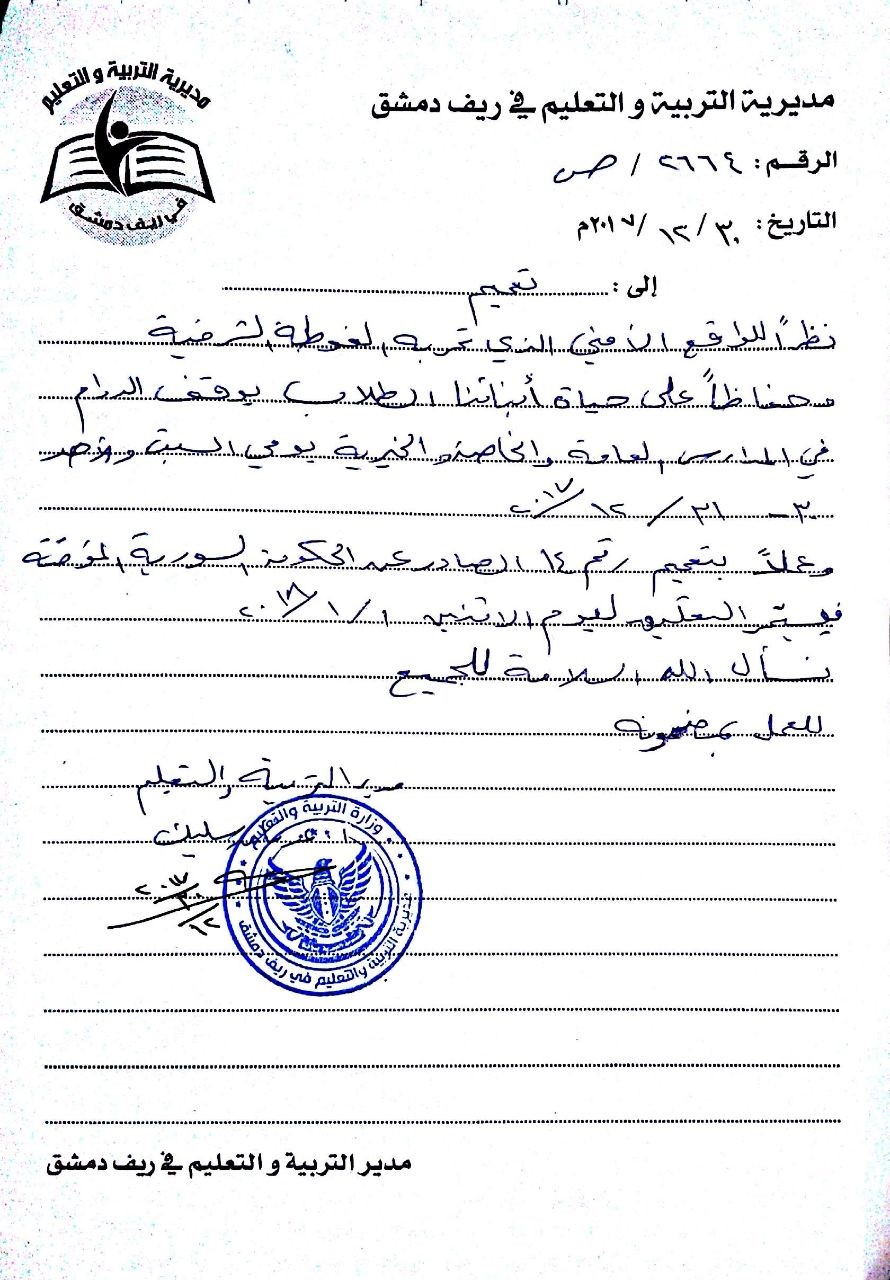
Image shows the first resolution of the Directorate of Education in Damascus countryside on December 30, 2017, in which it suspended school attendance in Eastern Ghouta.
Photo credit: Directorate of Education in Damascus countryside.
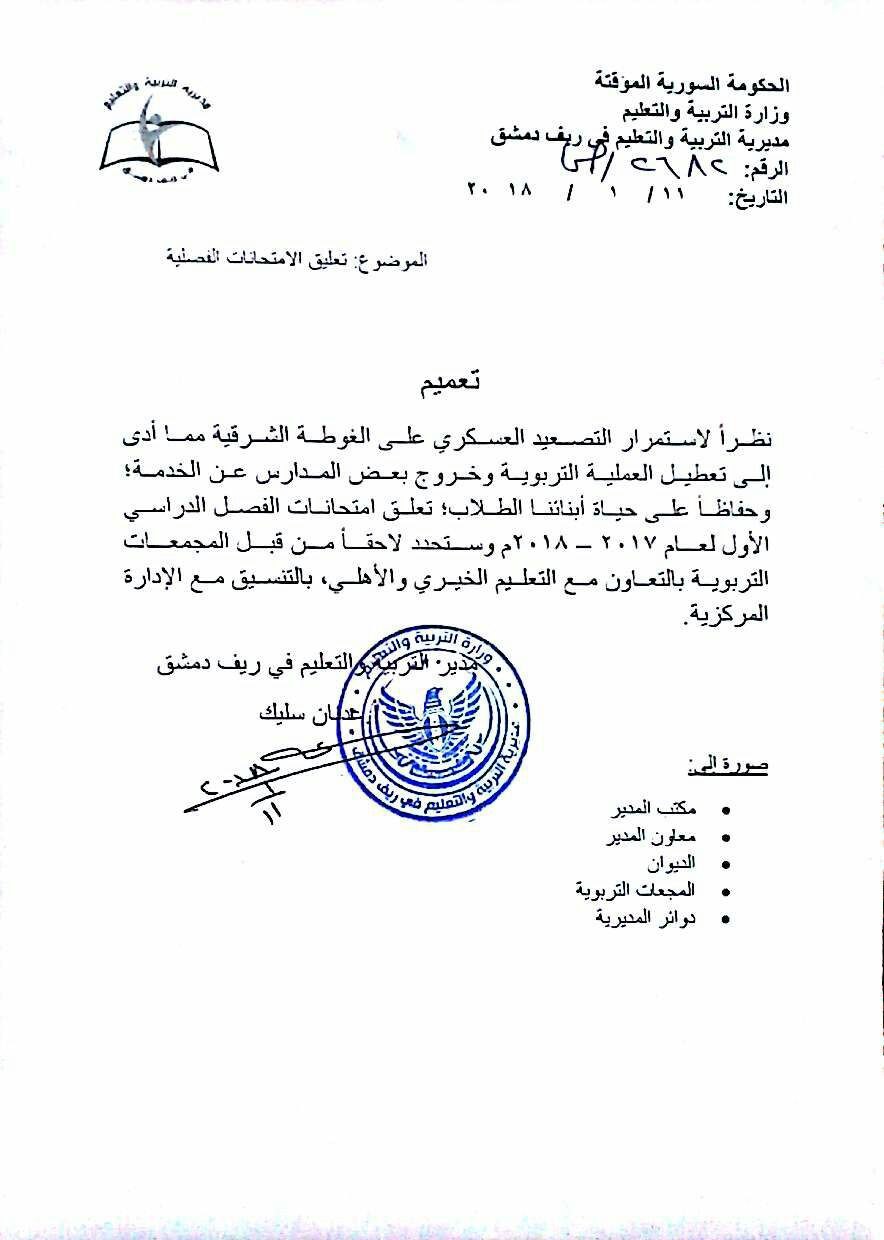
Image shows the resolution of the Directorate of Education in Damascus Countryside on January 11, 2018, in which it suspended the examinations.
Photo credit: The Directorate of Education in Damascus Countryside.
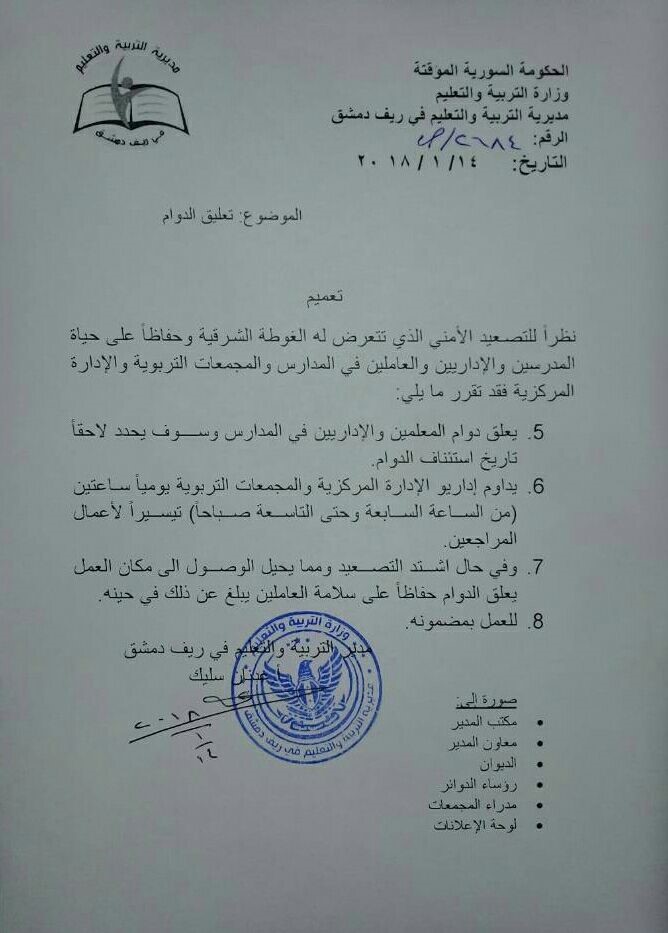
Image of the decision issued by the Directorate of Education in Damascus Countryside on January 14, 2018, in which it suspended working hours of school staff and shorten those of the Directorate's
Photo credit: The Directorate of Education in Damascus Countryside.
According to STJ reporter, two staff members of the Directorate of Education in Damascus Countryside were killed during the last military campaign on Eastern Ghouta; (Mustafa Harmoush) on January 8, 2018, following the shelling of his hometown Outaya and Mohamed Reslan, who also killed as a result of the shelling on January 11, 2018. Subsequent to that the staff of the Directorate of Education in Damascus Countryside launched an appeal (Teaching Staff is Annihilated), for the United Nations (UNESCO) to intervene and protect the education process, on January 14, 2018.
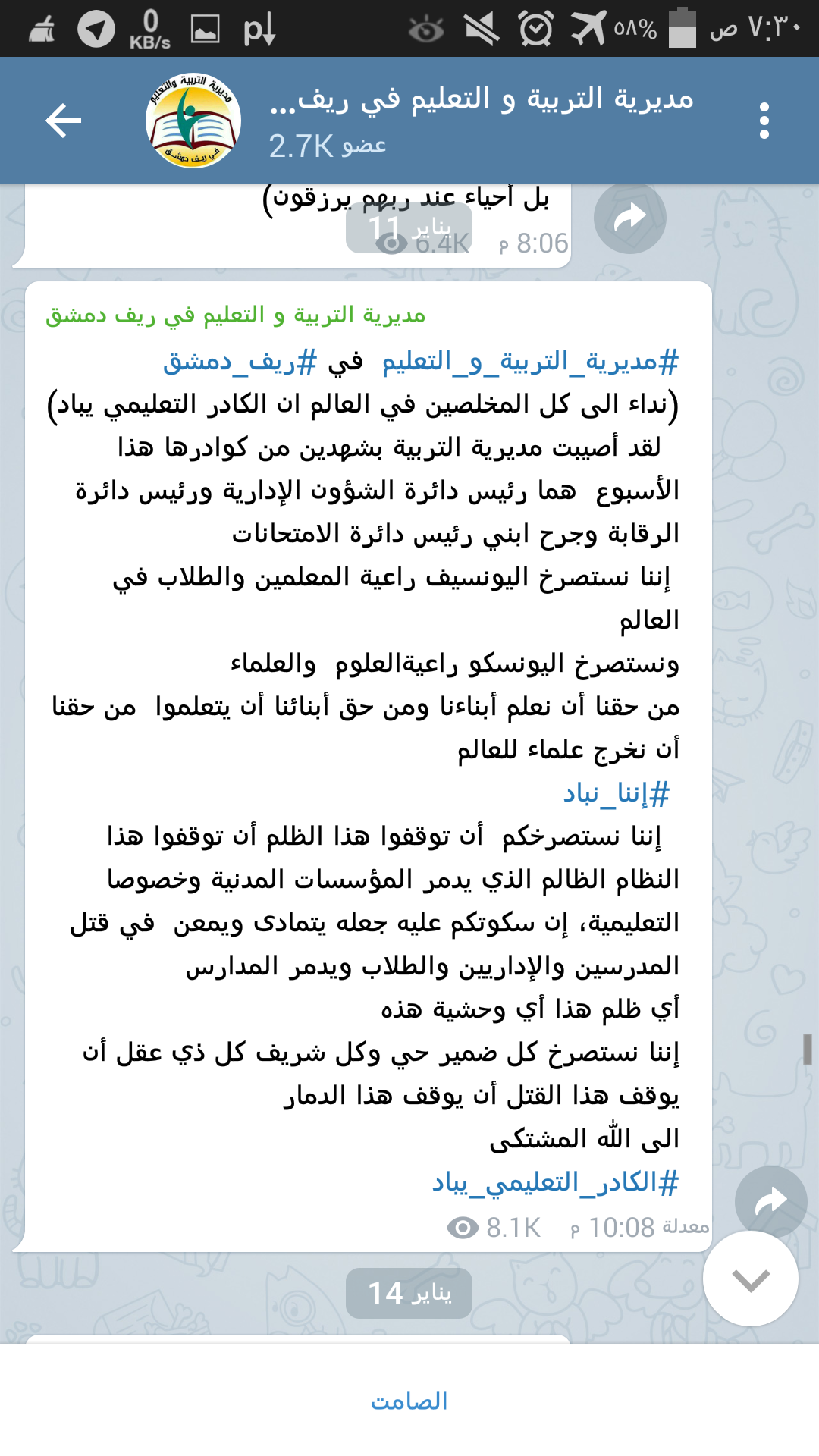
Image shows the appeal launched by the Directorate of Education in Damascus Countryside on January 14, 2018, which entitled "Teaching Staff is Annihilated".
Photo credit: Directorate of Education in Damascus Countryside.
Second: Targeting Schools with Aerial and Artillery Bombardment:
During the period December 29, 2017, to February 1, 2018, several schools in Eastern Ghouta were shelled, three of them are in Irbin town[8], which had been bombed by military aircraft, believed to be Russian, but the most affected one was “Al-Majd” high school, attacked by warplanes on January 5, 2018, resulting in the school to get out of service with no causalities, as the shelling was out-of-school-hours, according to STJ reporter.
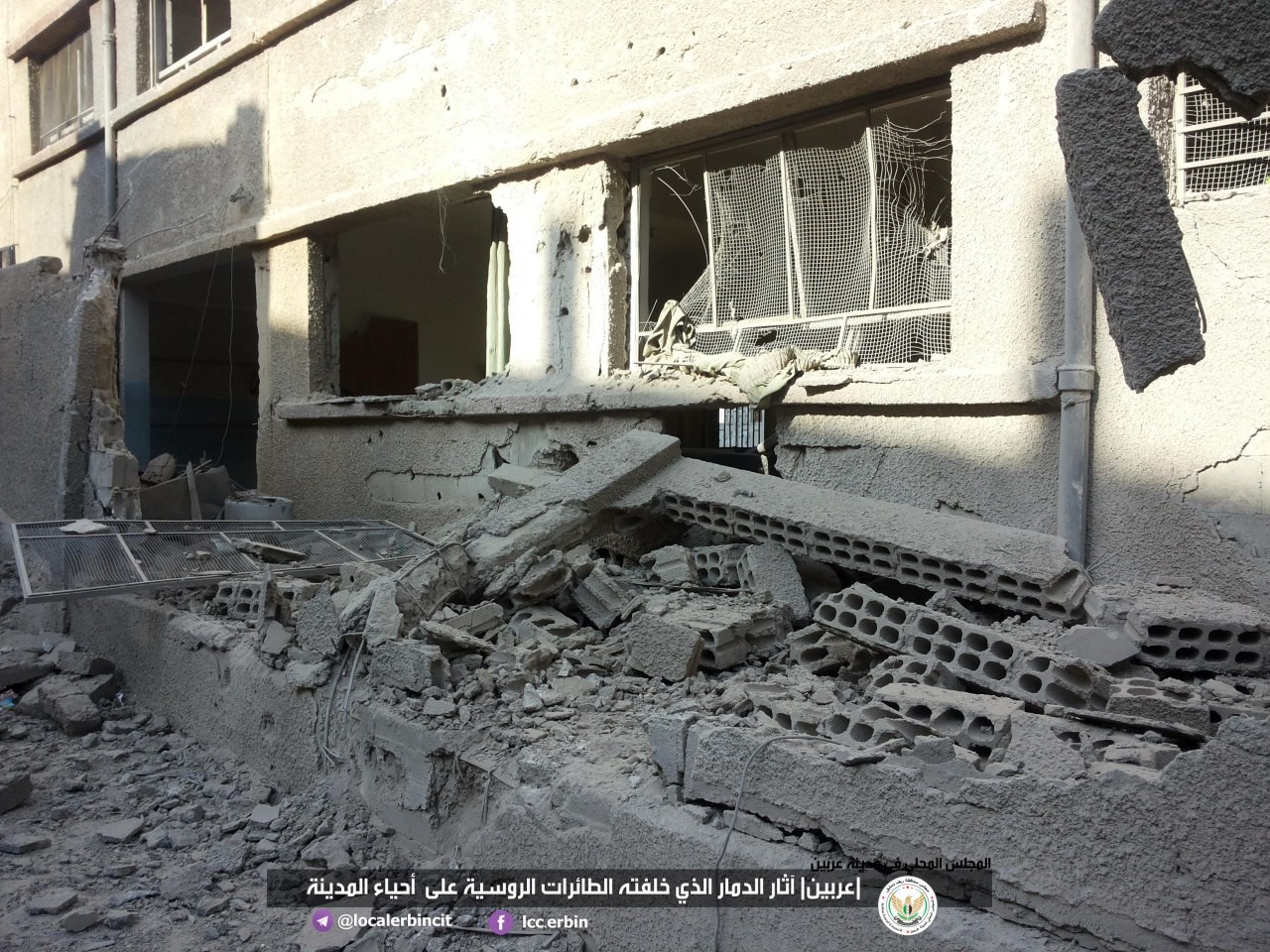
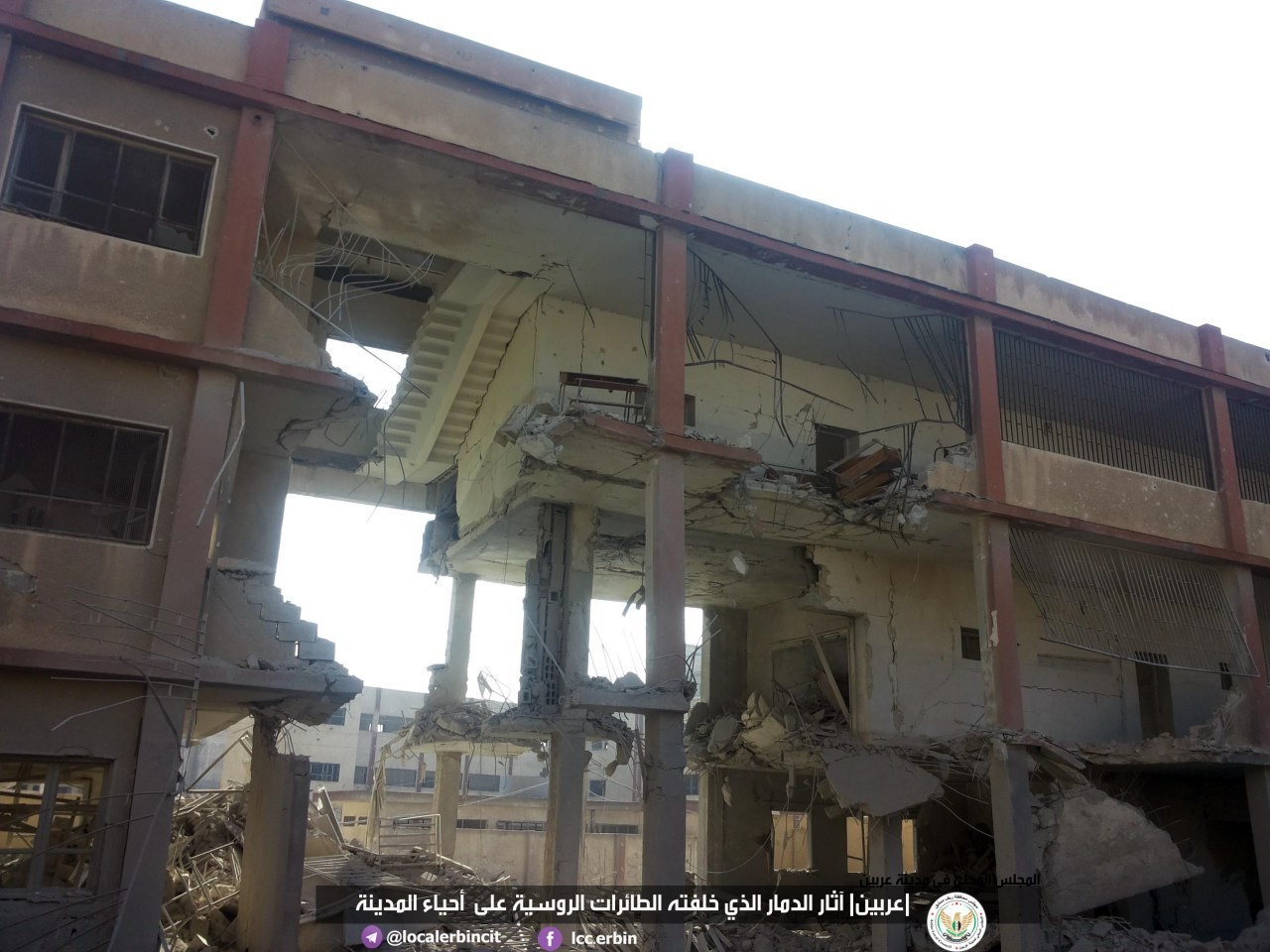
Image shows the destruction of “Al-Majd” high school in Irbin town, as a result of the aerial bombardment on January 5, 2018.
Photo credit: The Local Council of Irbin town.
In al-Marj area, three schools were shelled and materially damaged as a result, including a primary school in Outaya town[9], which was shelled on January 6, 2018, causing no causalities because of the suspension of the education process during that period.
A video footage published by Civil Defence in Damascus countryside on January 6, 2018, showed the landing of a shell on a school in Outaya, and the civil defense members checking the site.
In Duma, shelling the city's residential neighborhoods on February 1, 2018, hit "Dhiraar" Elementary School and Duma Linguistic Private Institute. According to STJ reporter, the shelling coincided with the students' departure from the Institute, at noon, which caused the deaths of two children, one of whom is a students of the Institute, they are (Tasneem al-Hinesh and Mahmoud al-Hinesh), and the injury of at least 12 civilians, including students of the Institute, as well as significant material damage to the Institute and the school, according to many testimonies obtained by STJ.
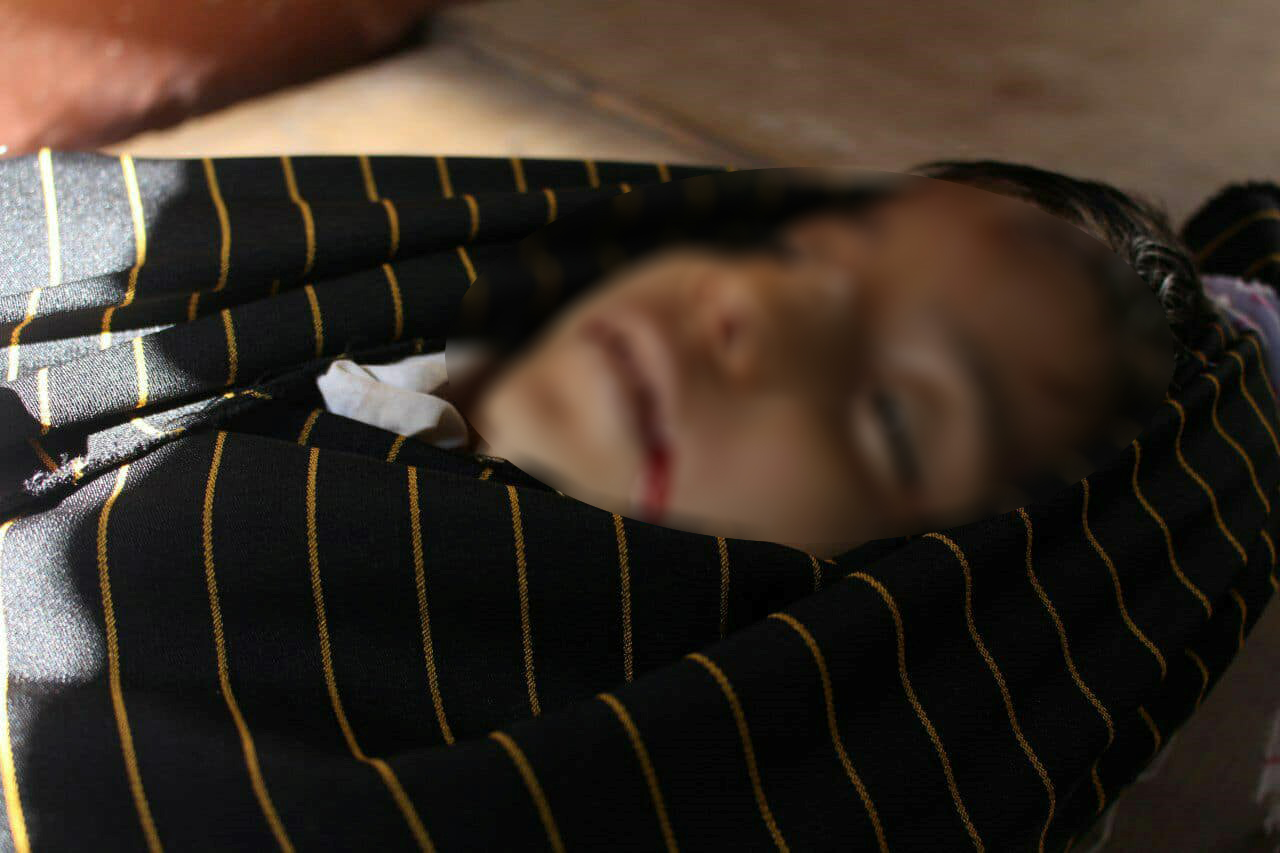
Image of a child who died as a result of artillery bombardment on Duma Linguistic Private Institute "Dhiraar" elementary school in Duma city, on February 1, 2018,
Photo credit: Activists from Duma.
The educational institution, represented by the Directorate of Education in Damascus countryside, suffers from difficulties in the process of restoration, the most important of which is the acute shortage of materials due to the intensification of the siege on Eastern Ghouta, as well as the fact that intensive shelling always prevents work of maintenance workshops, which is an impediment to the resumption the educational process, because there are no alternative places for students to attend in, and under such circumstances, it is not possible to find safe shelters that serve as an alternative to schools. In this regard, an official of the Education Complex in the central sector spoke about the damage done to the schools, especially in the central sector[10] during the recent military campaign, where he said:
"Since the start of the military campaign, about 15 schools have been bombed and destroyed completely or partially, in the first stage of the battle which began on November 15, 2017, three primary schools in Jisreen town were targeted by Golan local-made rockets which were launched from Al Mleha town, held by the Regime. In Saqba town, two schools, one for boys and the other for girls, were bombed by Russian warplanes. In Hamoryah, a kindergarten has been completely destroyed, in addition to another one affiliated to Teachers' Union which got out of service. During the second stage of the battle, which began in late December 2017 and lasted until the end of January 2018, three schools in Irbin were subjected to direct bombardment by Russian aircraft during the first days of the campaign, the last of which was a high school for girls that was hit by a Russian air raid which totally destroyed it and let it got out of service. The school had 263 students, and 30 staff members."
The Directorate of Education in Damascus countryside published an infograph on January 22, 2018, showed the number of schools bombed during 2017, where (6) schools were completely destroyed and (16) others were partially destroyed. There were also (16) injury among students and teachers, and (10) deaths.
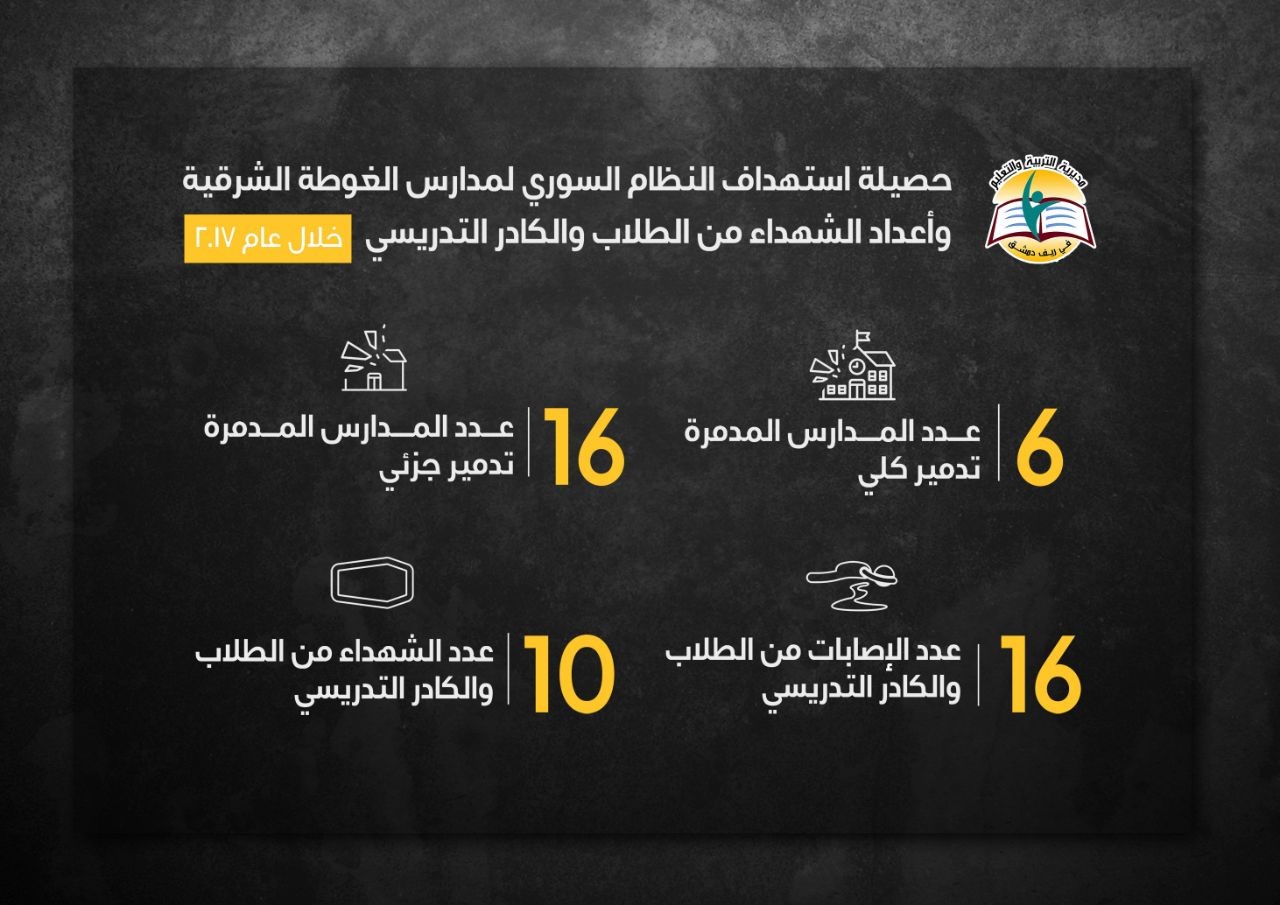
An infograph issued by the Directorate of Education in Damascus Countryside on January 22, 2018.
Photo credit: Directorate of Education in Damascus countryside.
1. This campaign started on November 15, 2017, following Ahrar al-Sham al-Islamiyya Movement’s announcement of its three-stage battle "They Were Wronged"in order to control the "Military vehicles Management", held by the Syrian army, in Harasta. The first stage began on November 14, 2017, in which the fighting resulted in the kill of a number of Syrian regular forces fighters along with the control of Ahrar al-Sham al-Islamiyya Movement on large portions of the Military Vehicles Management base in Harasta. while the second stage began on December 29, 2017, in which the battles led to impose siege on Military Vehicles Management by Ahrar al-Sham al-Islamiyya Movement, in addition to the latter’s control of Al-Ajami neighborhood, the Automated oven, and Al Hadaeq neighborhood, which stretches along the road between Harasta and Irbin from the west side of the Military Vehicles Management. While the third stage began on January 28, 2018, where the Ahrar al-Sham al-Islamiyya Movement blew up a ditch of the regular Syrian forces within the Military Vehicles Management in Harasta city, which resulted in the death and injury of a number of the Syrian regular forces fighters.
[2] It was established in the name of the Education Complex in Eastern Ghouta with the aim of conducting the educational process in mid-2013 and in August 2014, it evolved into a directorate and follows the Syrian interim government/Syrian Opposition Coalition’s resolutions.
[3] STJ is conducting investigations into this incident in cooperation with other international partners. The results of these investigations will be published as soon as they are completed.
[4] This attack coincided with the suspension of students’ school attendance, but Duma Linguistic Institute is a private institute that did not abide by these decisions, which caused the death of two children, one of whom is a student of the institute, as well as the injury of a number of other institute students, according to STJ reporter.
[5] The emergency plan was to conduct the examinations within two hours, starting at 6:30 am and ending at 8:30 am, to avoid shelling.
[6] Part of Harasta city is under the control of Ahrar al-Sham al-Islamiyya Movement.
[7] Duma city is under Jaysh al-Islam’s control.
[8] Irbin is under The al-Rahman Legion’s control.
[9] Outaya town is under Jaysh al-Islam’s control.
[10] The central sector is under The al-Rahman Legion’s control and it includes several cities and towns such as (Jisreen, Irbin, Saqba, Hamoryah, Hazeh, Zamalka, Jobar, Kafr Batna and Ein Tarma).

